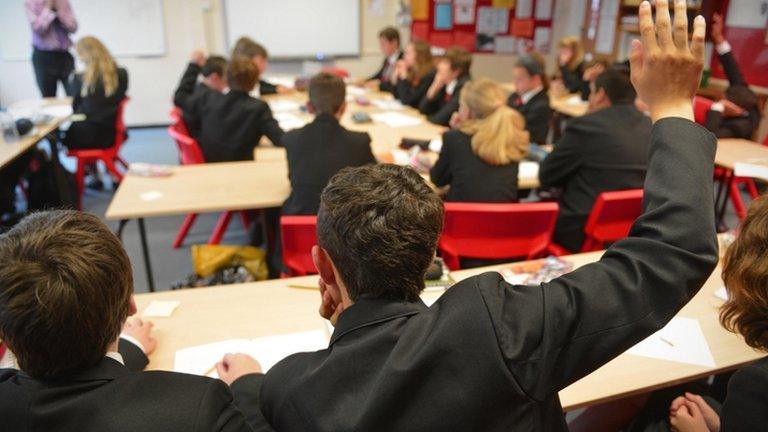Education watchdog Estyn wants high school attendance improved
- Published
A scheme that teaches children new skills is being used to stop absenteeism
Nearly a third of secondary schools inspected in Wales since 2010 have been told to improve pupils' attendance.
Education watchdog Estyn's latest report notes that overall attendance has gradually improved from 91% in 2008/9 to 92.6% in 2012/13.
But it warns vulnerable groups of pupils are being "disproportionately disadvantaged".
One south Wales school is tackling the problem by sending staff to wake pupils up from their beds.
Estyn's report found pupils eligible for free school meals were nearly twice as likely to miss school and underperform.
The absence rate for pupils with special educational needs (SEN) is also higher.
Ms Cahart told BBC Radio Wales staff knocked on the door of about five students every week
Persistent absentees now account for just over a quarter of all absences in secondary schools.
Anne Carhart, from Maesteg Comprehensive School, Bridgend, told BBC Radio Wales staff knocked on the door of about five students every week to get them to go to school.
The school is one of three highlighted as setting a good example for other schools in Wales by Estyn.

Better futures
Peak project co-ordinator Ian Pearce: "This centre is looked upon as another classroom"
Initiatives such as the Peak project in Newport aim to take pupils struggling with mainstream education and provide them with practical skills such as carpentry, bike maintenance and cookery.
The centre has just reopened after a National Lottery-funded revamp.
Fifteen-year-old Jock is one of the centre's success stories, and says he now feels "really positive about the future".
"School made me come here for two days a week and then I started to come for three days a week and started to enjoy it," he said.
"This has really improved my life - I've gained skills, things like carpentry, photography, cooking, art."

Jock, 15, has been learning practical skills at new education project in Newport
"Now I'm going to college next year to do a multi-skills course - plumbing, carpentry, an electrician's course - things like that.

Estyn chief inspector Ann Keane said she wanted to see pupil absences further reduced.
"Improving attendance has been a recommendation in nearly a third of secondary school inspection reports for the last four years," she said.
"If pupils are absent from school then they cannot learn and are likely to fall behind."
Estyn has made a series of recommendations to schools and local authorities, including strengthening links with external agencies and services that engage and support families.
It says around half of schools were not aware of support services or how to access them.
- Published10 September 2014

- Published27 June 2014

- Published11 March 2014

- Published28 January 2014
